Canadians Want Prudence, Not Pain, Ahead of Budget 2025
October 31, 2025
With the 2025 federal budget set for November 4, new polling from Abacus Data for the Toronto Star finds Canadians approaching the budget in a pragmatic, almost weary frame of mind. Few see the deficit as an urgent crisis, and most want the government to steer a steady course, reducing the deficit gradually, without drastic cuts or new taxes that would hit their wallets.
The Deficit: A Manageable Concern, Not a Crisis
Asked how they view the federal deficit, only 23% said it is “a serious problem that must be addressed immediately, even if it requires major cuts or tax increases.”
The largest group, 43%, believes the deficit “is a problem, but can be reduced gradually over time,” while another 21% are largely unconcerned, seeing it as acceptable if it funds key priorities or necessary investments.
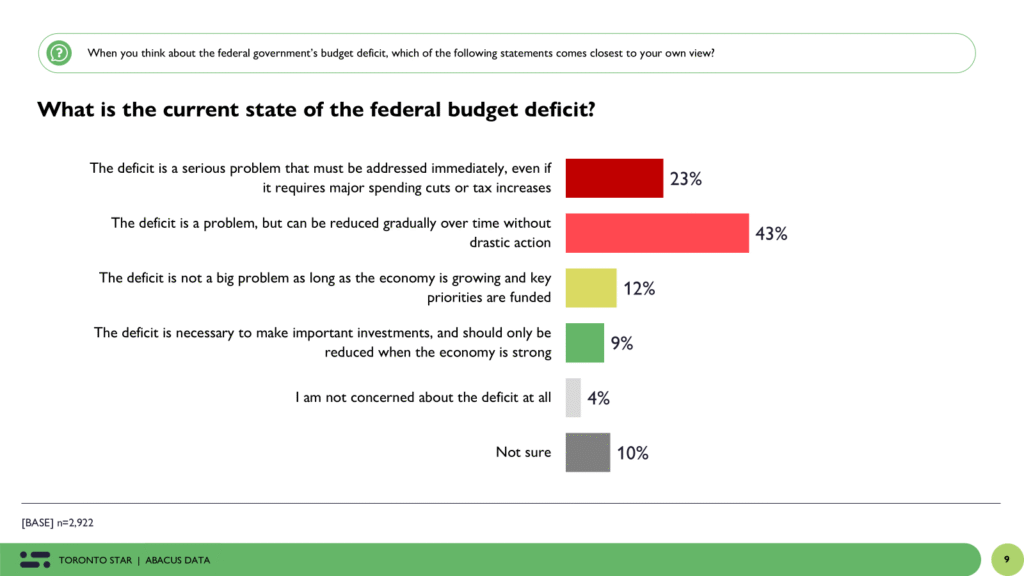
That pattern reveals a public with limited appetite for austerity. Even among Conservative supporters, only about one-third see the deficit as an emergency, compared with 15 % of Liberal and 13% of NDP voters. There is no significant difference by age.
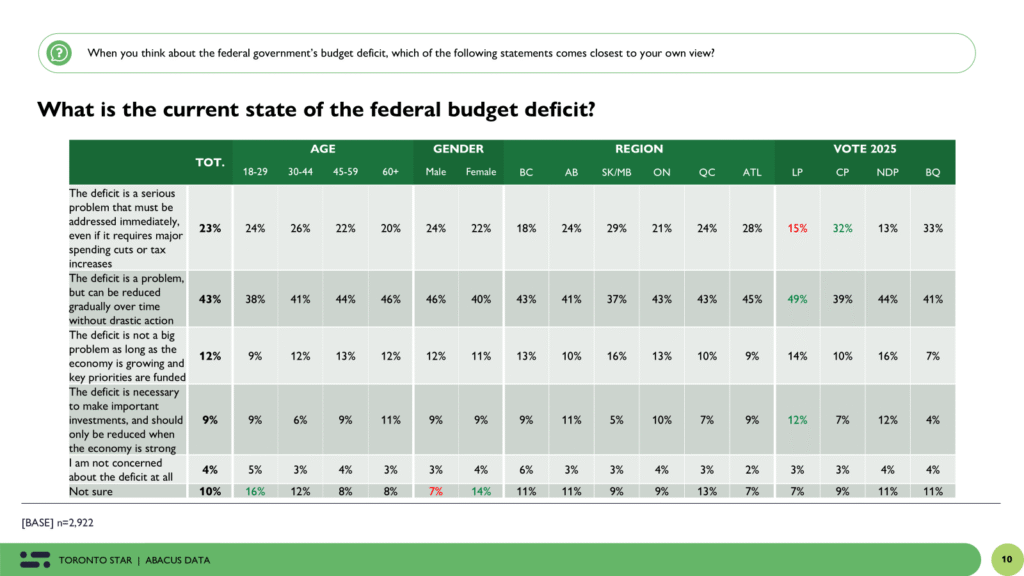
Preferred Approach: Gradual Adjustment Over Shock Therapy
When asked what approach the federal government should take, 37% favour reducing the deficit gradually with modest cuts and limited new investments — the clear plurality view.
Only 17% want the government to balance the budget as quickly as possible even if it means major cuts.
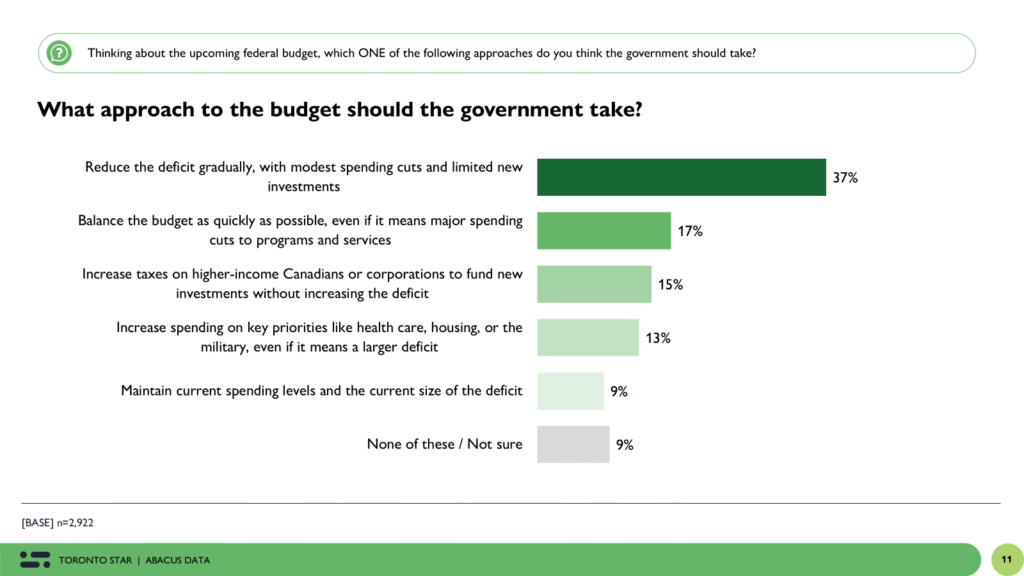
By contrast, 28% would rather maintain or expand spending:
15% want higher taxes on corporations or wealthy Canadians to fund investments without growing the deficit.
13% say the government should spend more on priorities like health care and housing, even if the deficit grows.
We don’t find much regional difference while politically, Conservative voters are more likely to prefer a more rapid reduction in the deficit than other party voters but even among Conservatives, the preference is for gradualism.
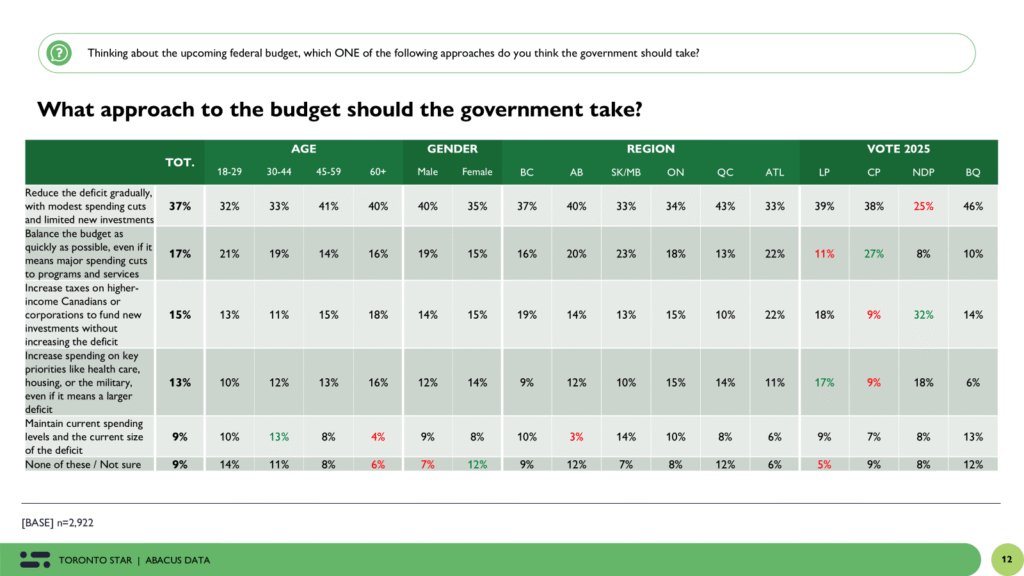
Appetite for Cuts and Taxes: Limited and Conditional
Most Canadians are open to modest measures but reject extremes.
A majority (55%) say across-the-board spending cuts would be acceptable, but similar numbers also support raising taxes on higher-income Canadians (59%) to fund new spending.
By contrast, only 30% find it acceptable to run a “much larger deficit”, and just 23% would accept a GST increase. Raising the retirement age to 67 is even less popular (24 % acceptable, 63 % unacceptable). The data underline Canadians’ fiscal pragmatism: they will accept “fair-share” taxes on the wealthy, modest restraint on spending, but draw the line at anything that feels punitive or regressive.
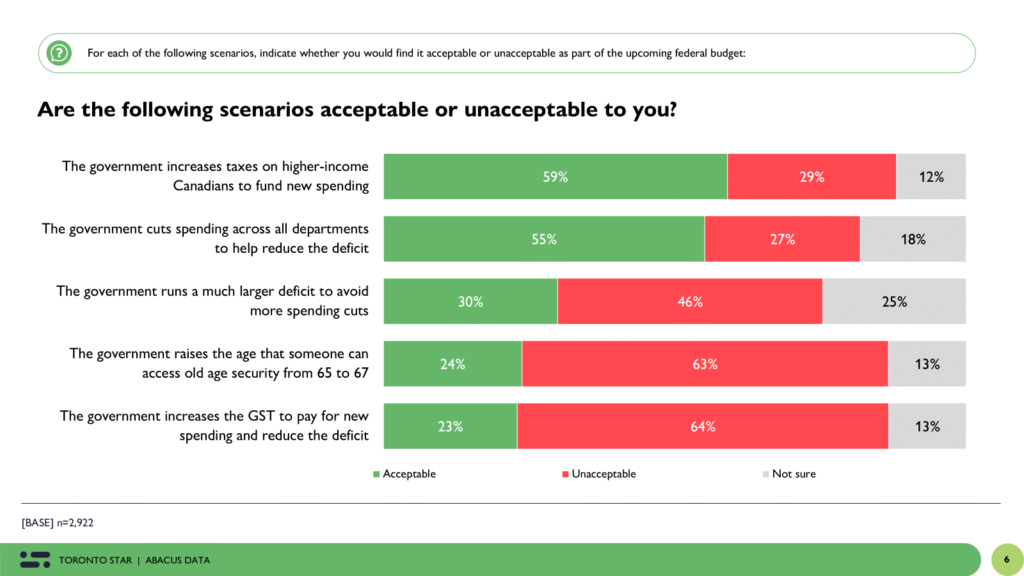
Spending Priorities: Protect the Essentials
When asked which areas should be protected from cuts even if taxes rise, health care (51%), affordable housing (46%), and seniors’ benefits (44%) topped the list. That hierarchy says much about the current mood: health care and housing remain two of the four pillars of anxiety in 2025 (with the cost of living and Trump the other two).
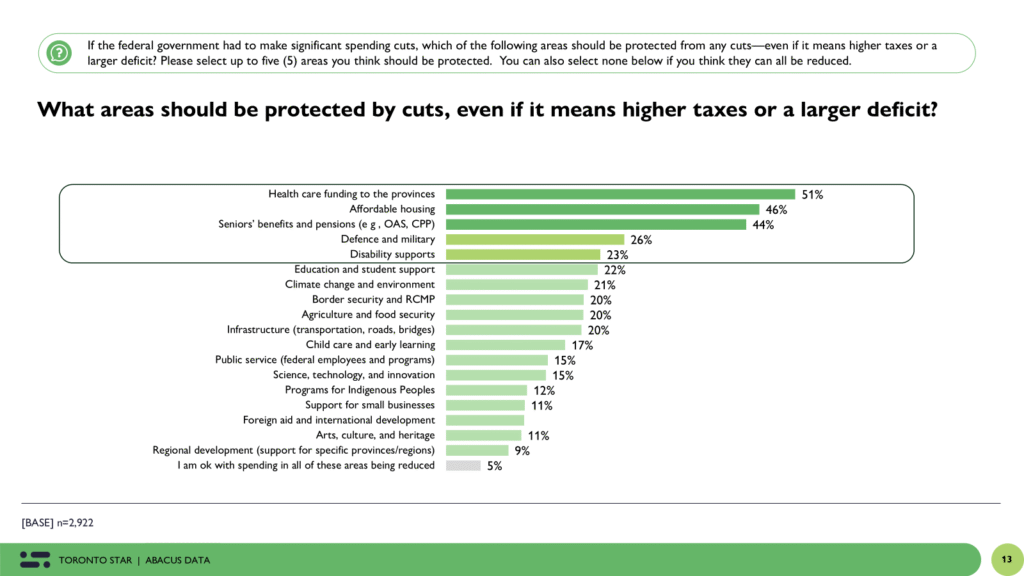
Younger Canadians emphasize housing and education; older respondents prioritize health, pensions, defence, and climate and the environment.
Partisan differences are more subtle and less directional.
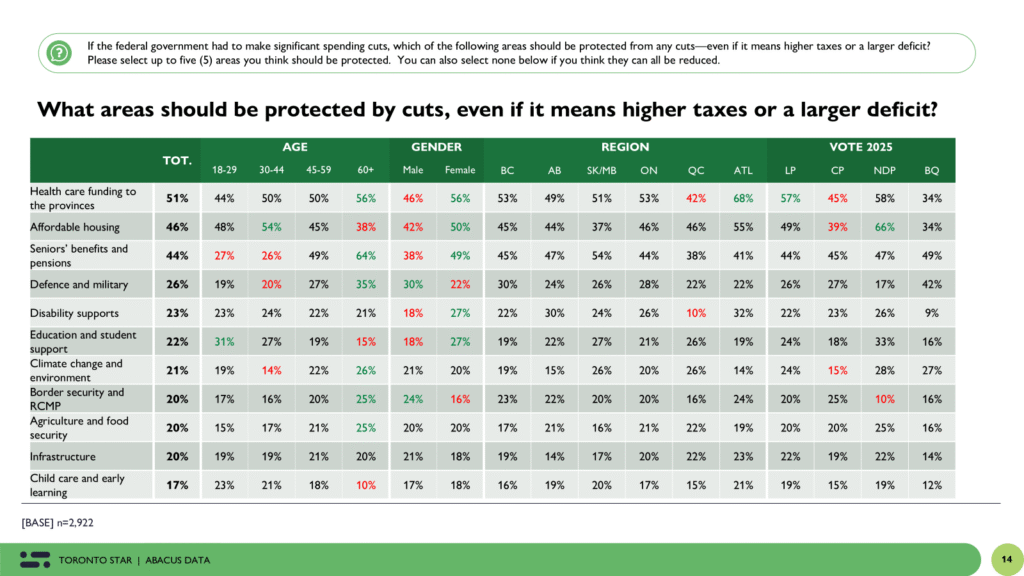
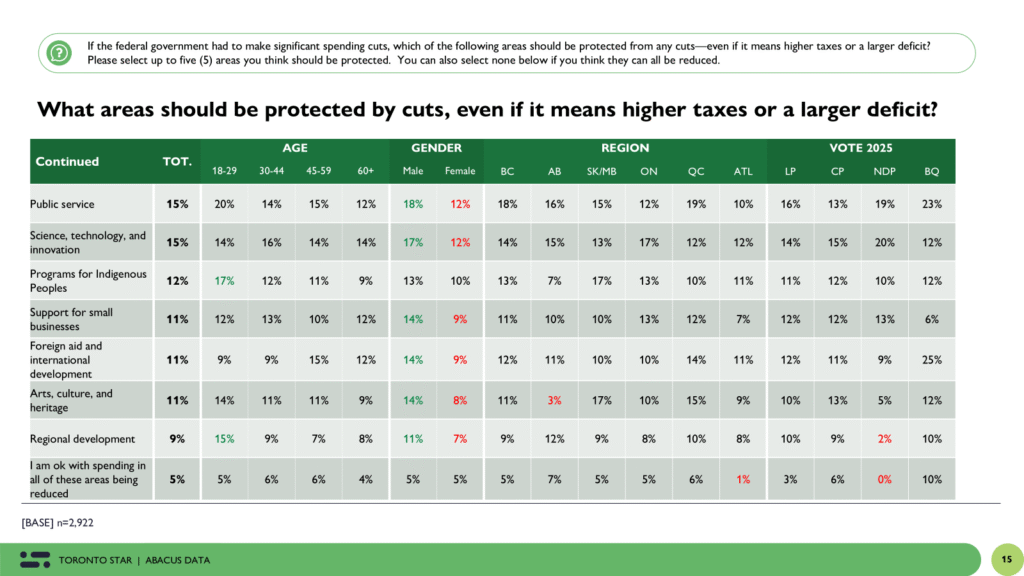
Only 5% said they were fine with cutting everything — a clear sign that few Canadians are clamouring for a return to 1990s-style austerity.
Carney vs Poilievre: A Contest of Trust and Risk
Perhaps the most telling result comes from a question about who Canadians trust to balance the budget in a way that would hurt people like them the least.
Mark Carney and the Liberal Party lead with 45%, compared with 38% for Pierre Poilievre and the Conservatives, while 17% remain unsure
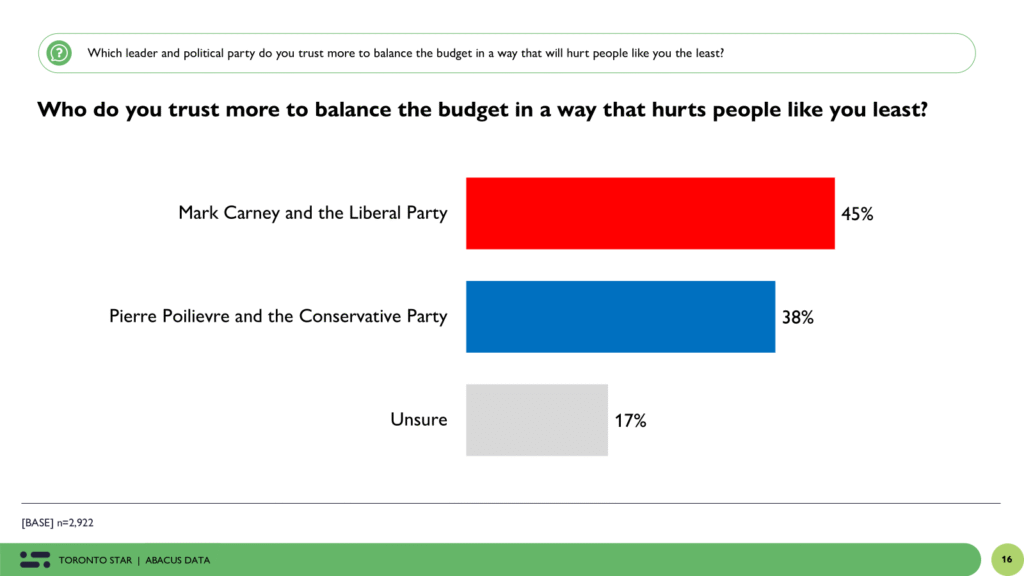
This measure, what we call “fiscal empathy”, cuts across the partisan divide.
Carney’s edge is widest among women (+11) and in Ontario (+10) and Quebec (+22). Poilievre leads in Alberta and Saskatchewan-Manitoba but trails badly in Atlantic Canada.
Among 2025 vote-intention groups, the results are predictable but revealing: 84% of Liberal voters trust Carney, while only 8% of Conservatives do.
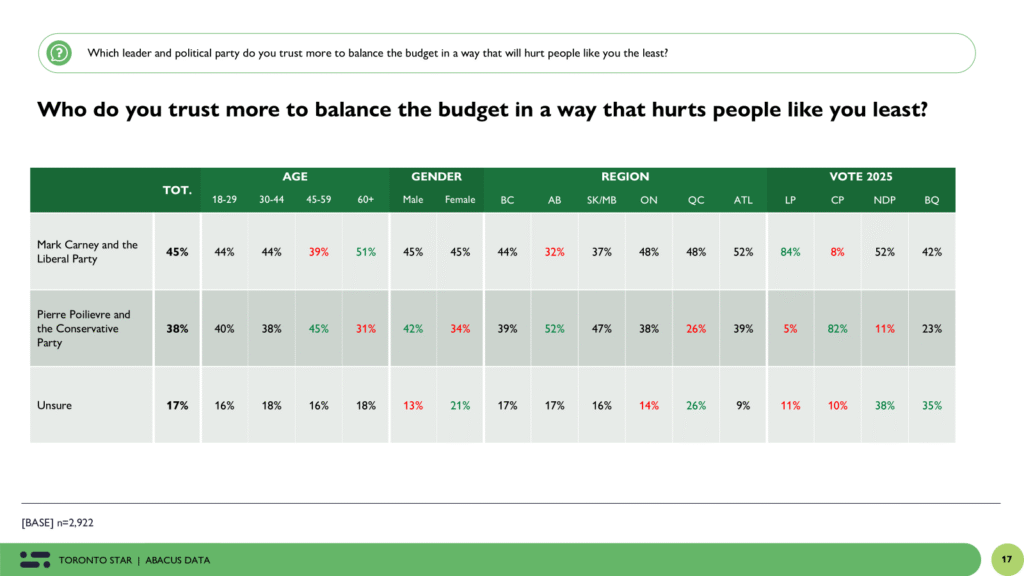
The Upshot
Heading into the 2025 federal budget, Canadians are pragmatic, not panicked. Most see the deficit as manageable — 43% say it can be reduced gradually, while only 23% view it as an urgent crisis demanding cuts or tax hikes. The appetite for austerity is low; the public prefers steady, predictable management over disruption.
Canadians are open to “fair-share” measures — modest spending restraint and higher taxes on the wealthy — but reject anything that feels punitive, such as GST hikes or raising the retirement age. Health care, housing, and seniors’ benefits remain untouchable priorities.
At the heart of this mood is fiscal empathy: trust in who can balance the books without hurting ordinary people. On that front, Mark Carney holds a narrow advantage — 45% trust him and the Liberals to manage the budget fairly, compared with 38% for Pierre Poilievre.
Expectations and public preference are also pulling in opposite directions. Almost seven in ten Canadians (69%) want the deficit reduced—whether gradually or rapidly—while expectations point to it increasing. The plurality (37%) favour slow, steady deficit reduction, another 17% want it balanced quickly, and only a minority support holding or expanding spending. That tension creates a political vulnerability for the Carney government: even if Canadians reject austerity, they still expect visible discipline. A budget that appears to loosen control, without a convincing path toward gradual balance, could erode the fiscal empathy advantage the Liberals currently hold.
The message to Ottawa is clear: steer a steady course. Canadians want competence, not crusades; reassurance, not revolution. With global uncertainty rising and Trump re-entering the political frame, the 2025 budget is less about bold new ideas than about proving that calm, careful leadership still has value in anxious times.
Methodology
The survey was conducted with 2,922 Canadians from October 24 to 29, 2025. A random sample of panelists were invited to complete the survey from a set of partner panels based on the Lucid exchange platform. These partners are typically double opt-in survey panels, blended to manage out potential skews in the data from a single source.
The margin of error for a comparable probability-based random sample of the same size is +/- 1.8%, 19 times out of 20.
The data were weighted according to census data to ensure that the sample matched Canada’s population according to age, gender, and region. Totals may not add up to 100 due to rounding.
Abacus Data follows the CRIC Public Opinion Research Standards and Disclosure Requirements that can be found here: https://canadianresearchinsightscouncil.ca/standards/
The survey was paid for by Abacus Data Inc.
About Abacus Data
We are Canada’s most sought-after, influential, and impactful polling and market research firm. We are hired by many of North America’s most respected and influential brands and organizations.
We use the latest technology, sound science, and deep experience to generate top-flight research-based advice to our clients. We offer global research capacity with a strong focus on customer service, attention to detail, and exceptional value.
And we are growing throughout all parts of Canada and the United States and have capacity for new clients who want high quality research insights with enlightened hospitality.
Our record speaks for itself: we were one of the most accurate pollsters conducting research during the 2025 Canadian election following up on our outstanding record in the 2021, 2019, 2015, and 2011 federal elections.
Contact us with any questions.
Find out more about how we can help your organization by downloading our corporate profile and service offering.




